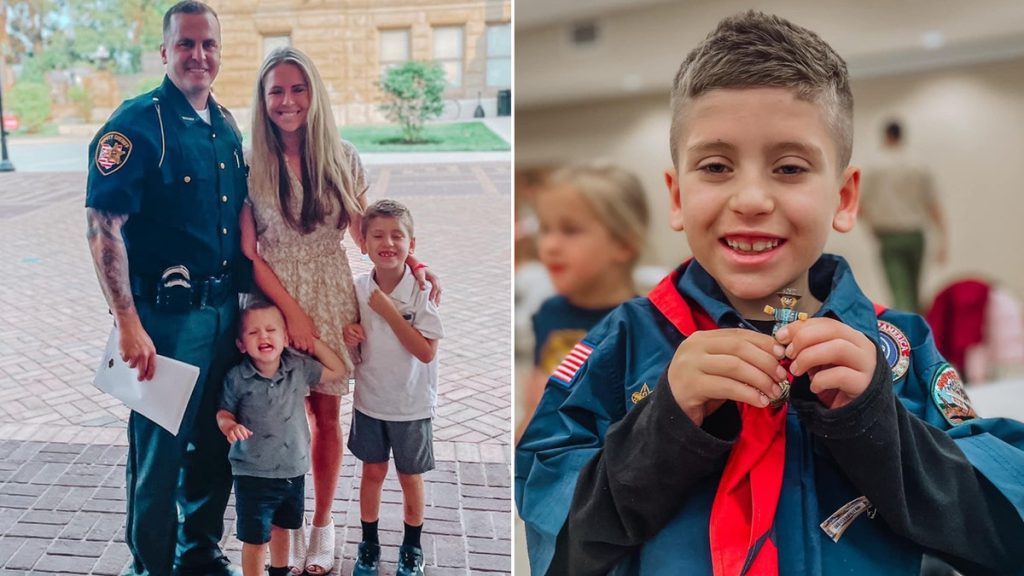
For the three out of every 100,000 children who are born with Batten disease, the diagnosis is one of the most devastating that a family can receive.
Emily Blackburn, 32, found out in March 2023 that her 7-year-old son, Grayson Naff, has the rare, genetic, fatal disorder.
Now, the Ohio family is faced with the harsh reality that Naff will ultimately lose his sight, then his cognitive abilities and motor skills.
The life expectancy for children with Batten disease is usually five or six years after symptoms begin.
HEART DISEASE RISK INCREASES FOR YOUNG ADULTS WHO HAVE LOST A SIBLING, STUDY FINDS
Shortly before her son started first grade, Blackburn took him to the eye doctor for what she thought was a routine visual exam.
She’d noticed it was more difficult for him to see the TV screen, so she assumed he needed glasses.
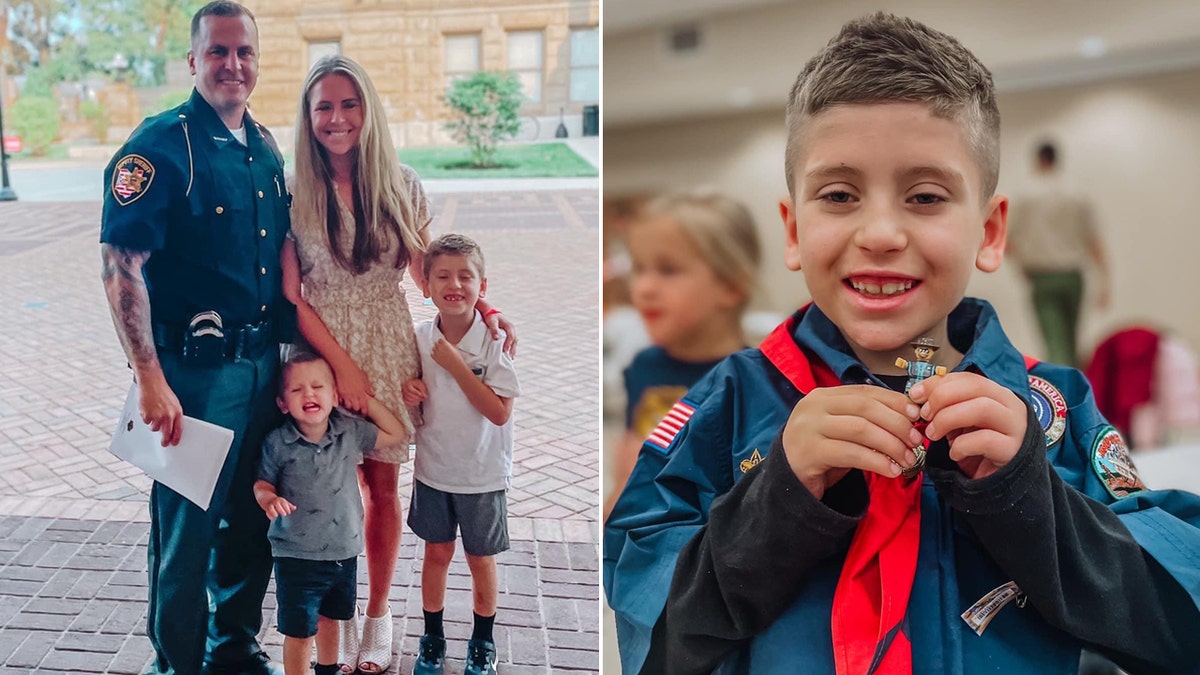
Grayson Naff, 8, pictured at right and with his family, was diagnosed with Batten disease in spring 2023. “I really don’t have words for it,” said mom Emily Blackburn to Fox News Digital. (Emily Blackburn)
During the exam, the doctor noticed something concerning in Naff’s retina and sent the family to a retina specialist in Cincinnati.
“At first, they thought that it was a disease called Stargardt, which is where you lose your central vision and become legally blind,” Blackburn told Fox News Digital in an interview.
That was heartbreaking in itself, she said — “enough to send you into a spiral” — but things got even worse when the doctors decided to do some genetic testing to confirm the diagnosis.
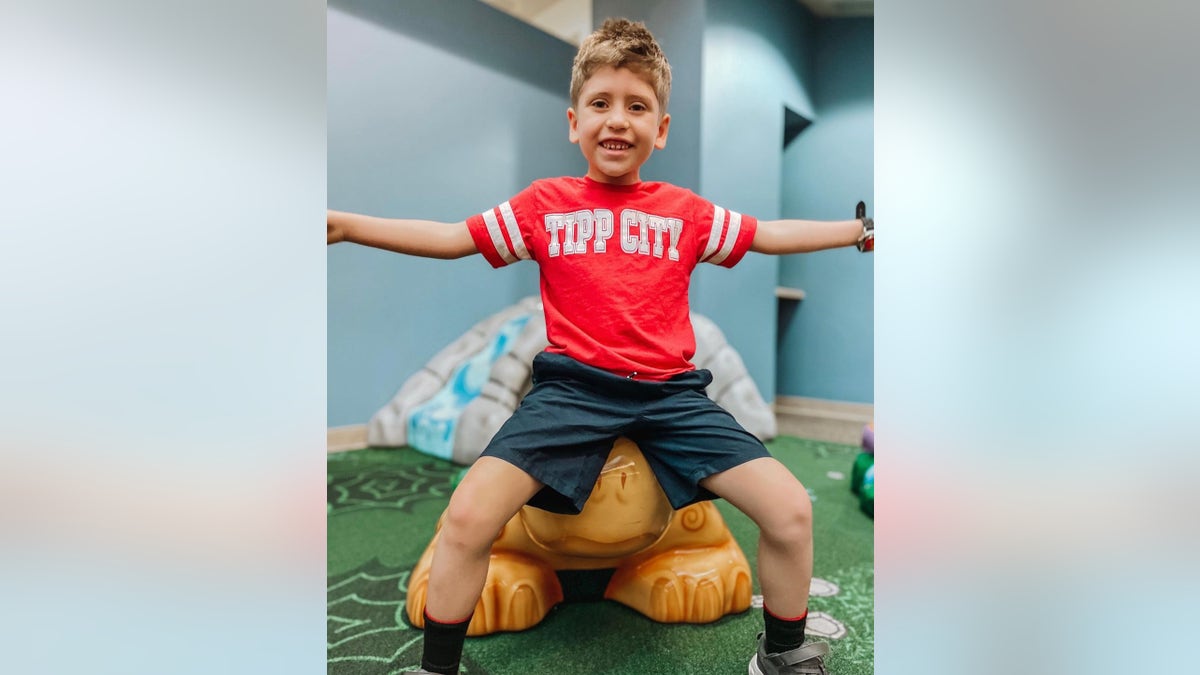
Grayson Naff was 7 when he was diagnosed with Batten disease. He still attends his same public school, where he is in second grade. (Emily Blackburn)
It turned out the first diagnosis was incorrect. And with tears in their eyes, the geneticists informed Blackburn during a Zoom call that her son actually had Batten disease.
“We went from thinking our son would become legally blind to finding out that he has this fatal disease with no cure,” Blackburn said. “I really don’t have words for it. It’s unbelievable. It’s soul-crushing.”
What is Batten disease?
A fatal genetic disorder, Batten disease interferes with the body’s ability to eliminate cellular waste, per Cleveland Clinic’s website.
As the excess lipids and proteins build up, they cause vision loss, seizures, cognitive decline, impaired mobility and death.
There is currently no cure for the disorder.
“It’s unbelievable. It’s soul-crushing.”
Batten disease is usually diagnosed through genetic testing, when an abnormal change is found in one of the several genes associated with the disease, noted Christelle Moufawad El Achkar, M.D., a neurologist in the Division of Epilepsy and Clinical Neurophysiology at Boston Children’s Hospital.
There are 13 different types of Batten disease, each involving a different gene. Naff was diagnosed with CLN3.

Grayson Naff is pictured with his little brother. “Grayson is such a great big brother to Beckett,” Blackburn said. “They’re best friends.” (Emily Blackburn)
“Within each gene, there can be different clinical subtypes with different ages of onset and severity, starting from infancy until adulthood,” Moufawad El Achkar told Fox News Digital.
“This can make diagnosis harder, especially in the early stages of the disease.”
Early diagnosis is very important, the doctor emphasized, especially because some types of disease can be slowed with therapies.
PENNSYLVANIA MOTHER AND SON BOTH BORN WITH RARE GENETIC DISEASE: ‘CLOSER BECAUSE OF THIS’
Early symptoms of Batten include loss of balance, falls and slurring of speech.
Epilepsy or seizures can be an early sign in some subtypes, but might only happen later in some patients, said Moufawad El Achkar.
Gradual loss of vision is seen in almost all patients at some point in the disease.

“We try to keep him as educated as we can on his vision while still allowing him to be the same little boy he is now,” Naff’s mother told Fox News Digital. (Emily Blackburn)
“It is crucial to suspect and test for Batten disease in any child who has loss of skills, especially if accompanied by seizures, at any age,” the doctor said.
As her son’s vision had already declined considerably at the time of his diagnosis, it is now 20/200, which qualifies as legally blind, Blackburn shared.
Only his vision has been impacted so far, but doctors have warned Blackburn of what’s to come over the next couple of years — including dementia, decline in motor skills and seizures.
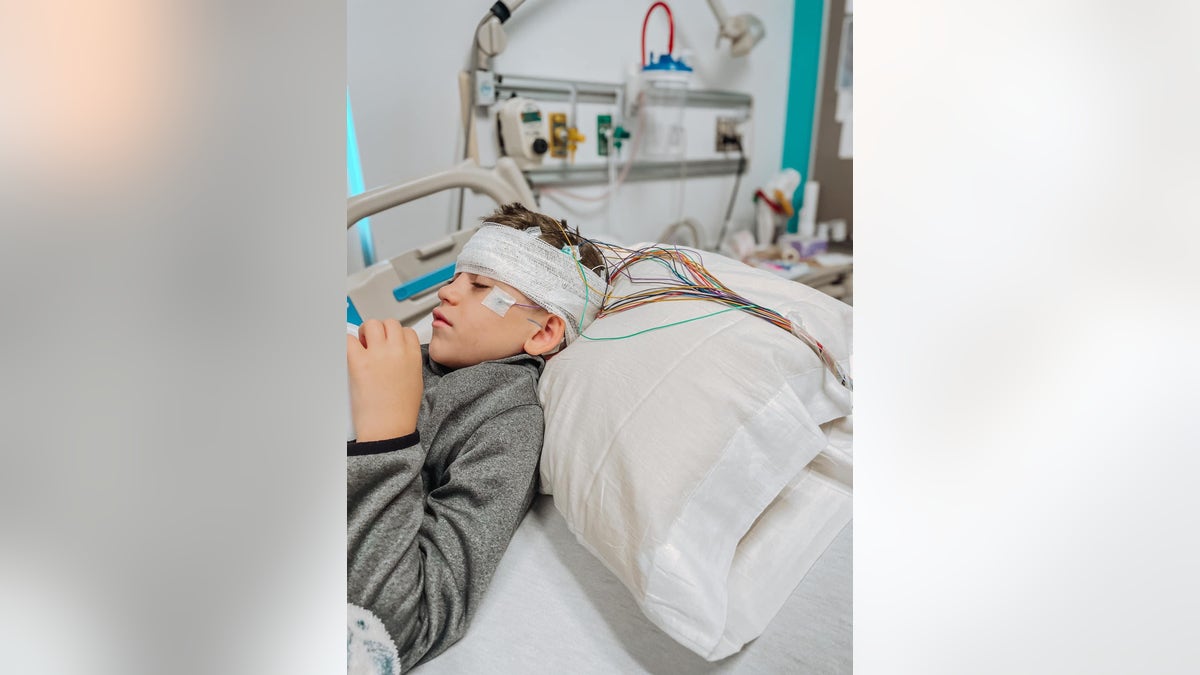
Grayson Naff will have an EEG (electroencephalography) each year to monitor his brain waves for seizure activity. (Emily Blackburn)
As of now, he only knows about his vision struggles — Blackburn has not told him about the Batten disease diagnosis.
“We try to keep him as educated as we can on his vision while still allowing him to be the same little boy he is now,” Blackburn told Fox News Digital.
“We feel like the weight of all the other symptoms is just too hard, too much for him to carry.”
MUSCULAR DYSTROPHY BREAKTHROUGH: FDA APPROVES FIRST-EVER GENE THERAPY FOR RARE CHILDREN’S DISEASE
Naff still attends the same public school, where he works with a teacher for the visually impaired.
“We have amazing teachers and amazing friends in our community,” Blackburn said.
Multidisciplinary care
Patients affected by Batten disease need a multidisciplinary team to help manage their symptoms and design a plan to provide the best quality of life possible, Moufawad El Achkar noted.
Naff’s primary care team is at Nationwide Children’s Hospital in Columbus, Ohio.
Twice a year, the family drives to the University of Iowa Hospitals & Clinics to see an eye doctor, who prescribes an experimental medicine to help preserve Naff’s vision for as long as possible.
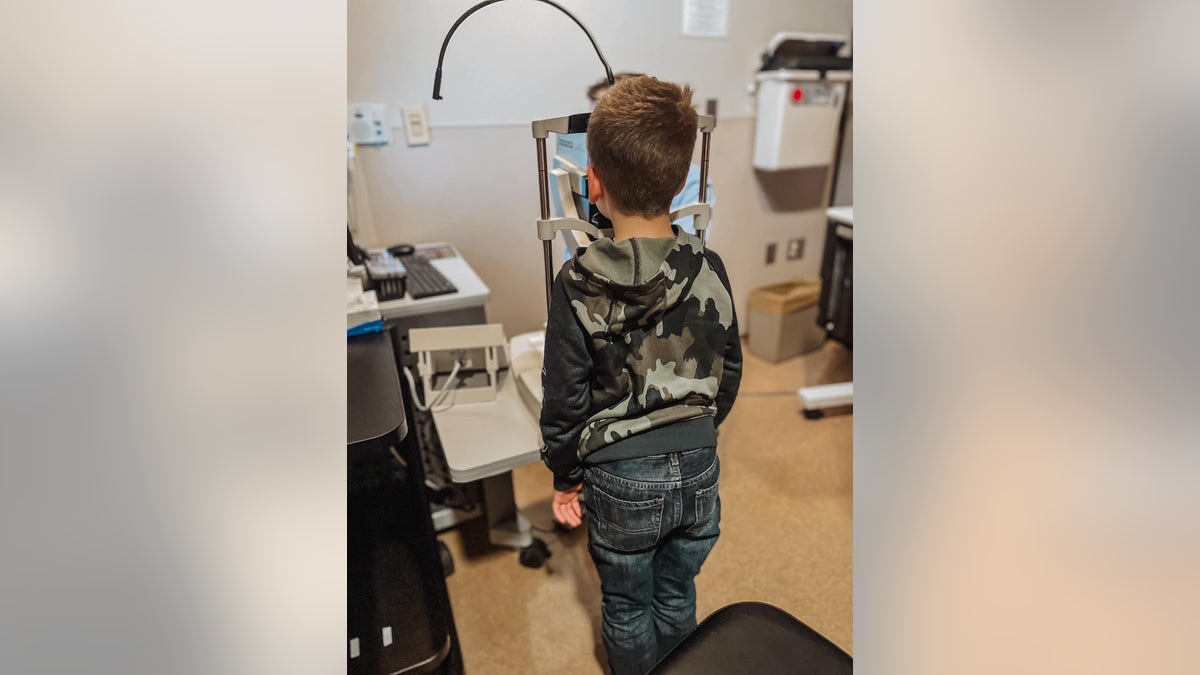
Twice a year, the family drives to the University of Iowa Hospitals & Clinics to see an eye doctor, who prescribes an experimental medicine to help preserve Naff’s vision for as long as possible. (Emily Blackburn)
They also travel to Texas Children’s Hospital in Houston to see a neurologist.
Naff will have an EEG (electroencephalography) each year to monitor his brain waves for seizure activity.
He is currently taking a medication called Miglustat, which could help to ease or slow down symptoms. Although the drug is FDA-approved for another condition called Gaucher disease, it is not yet approved for Batten.
“Since it’s not FDA approved, it has a hefty copay cost — if insurance doesn’t cover it, it’s about $100 a pill, or $9,000 a month,” Blackburn said.
PENNSYLVANIA PARENTS HONOR THEIR DAUGHTER WHO DIED OF A RARE GENETIC DISEASE: ‘SWEETEST GIRL IN THE WORLD’
Through an initiative called Guiding Grayson, the family has held events to help raise money for Naff’s costly care.
“Having the support from our community and our friends has been one of the best things to come out of this,” said Blackburn.
All the funds raised for Naff have gone toward the cost of the Miglustat.
“We feel like the weight of all the other symptoms is just too hard, too much for him to carry.”
Blackburn has quit her job as a project manager so she can dedicate her time to taking care of Naff and her younger son.
“There are a lot of unknowns and a lot of scary things, but we hope that the medication can hold off Grayson’s symptoms for as long as possible until there’s a cure,” she added.
Clinging to hope
Because each gene involved in the various types of Batten disease has a different mechanism, finding treatment for each one has been a very difficult process, noted Moufawad El Achkar.
“There have been some oral medications that over time might have shown some delay in the progression of the disease, but none have been shown to affect the course of the disease,” she said.
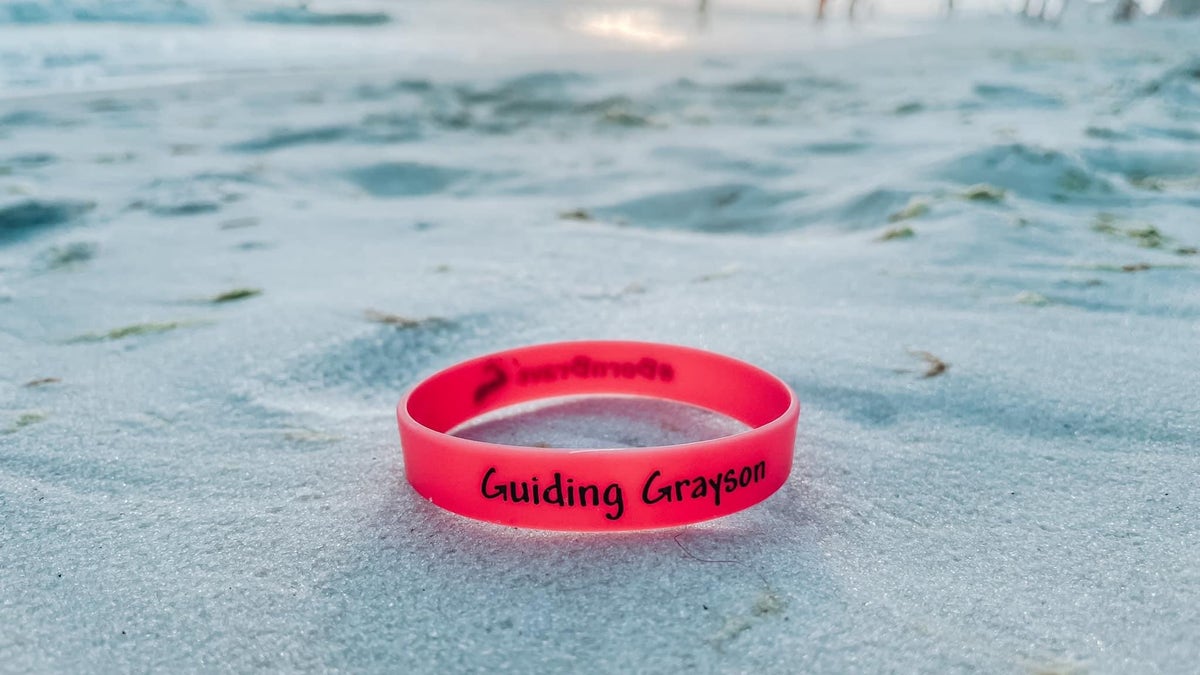
Through an initiative called Guiding Grayson, the family has held fundraising events to help collect money for Naff’s costly care. (Emily Blackburn)
A drug called Cerliponase Alpha has been shown to significantly slow down symptoms of Batten disease type 2, noted Moufawad El Achkar.
Gene therapies have also been developed for some types and are in early clinical trial stages, but have not yet been administered in the U.S.

Emily Blackburn is pictured with her family. Grayson Naff, center, is now legally blind due to his Batten disease. (Emily Blackburn)
“Research is ongoing to look for therapies for virtually all of the subtypes, but most are at the pre-clinical stage at this time,” said Moufawad El Achkar.
“A lot of strides have been made, but we need a lot more treatment options to be developed, tailored to each subtype, and we need them as soon as possible.”
“Collaboration between scientists, medical teams and family associations all over the world is absolutely necessary to make any meaningful progress in treating these extremely rare disorders,” the doctor added.
CLICK HERE TO SIGN UP FOR OUR HEALTH NEWSLETTER
Blackburn said she is holding out hope for a cure in her son’s lifetime.
“Scientists are working tirelessly to try to find a cure for this disease,” she said. “It just takes a while for gene therapy to be approved, so that’s what is scary.”
“One of our main goals is to raise awareness for research and funds for a cure — and just to let Grayson know how much we love him.”
“Some days, I’m really hopeful and I feel like Grayson can beat this, and then some days it’s just debilitating and gut-wrenching — it feels like we’re in a nightmare,” Blackburn went on.
CLICK HERE TO GET THE FOX NEWS APP
“One of our main goals is to raise awareness for research and to raise funds for a cure — and just to let Grayson know how much we love him.”
For more Health articles, visit www.foxnews.com/health.

 Latest Breaking News Online News Portal
Latest Breaking News Online News Portal




